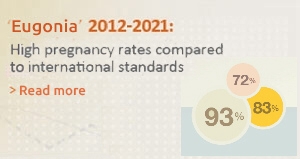In cases of repeated failed IVF attempts, especially for women of advanced age, in couples with normal karyotype and severe male infertility, or in cases of repeated early pregnancy loss, the embryos may undergo preimplantation genetic screening (PGS). Using special cytogenetic methods (FISH or array-CGH) it is possible to screen some or all the chromosome of each embryo.
Screening one or even two cells of an embryo may not always be accurate, and may be misleading in cases of embryo mosaicism. Mosaicism is a condition in which an embryo may contain both euploid and aneuploid cells.It has been reported in the literature that the application of PGS in women over the age of 35 does not lead to increased birth rates. Despite the skepticism that was associated with these studies, since then the method is less frequently used, and some official bodies like the British Fertility Society have advised against the use of PGS with FISH.A more accurate diagnosis of an embryos chromosome status can be obtained by studying all the chromosomes. Comparative genomic hybridization (CGH) is a recently developed genetic method that studies the entire genome, with very promising results.
It is necessary that all couples who are candidates for PGS seek genetic consultation by a geneticist.
The scientific team at Eugonia has the required training and expertise to offer PGS.































